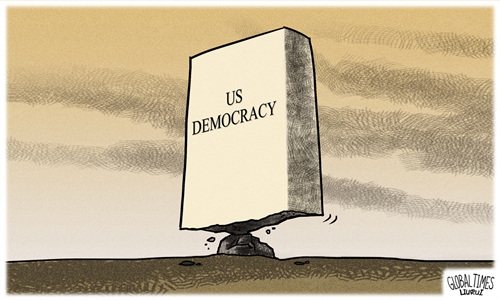
Is that a gift? Illustration: Liu Rui/Global Times
The National Endowment for Democracy (NED) is set to hold its annual democracy assembly in Taipei. Some people find this news surprising. That the meeting is being hosted by NED is not a surprise at all, but that they chose China's Taipei as the venue may be something of a surprise to some people. The NED was formed in 1983 to "promote freedom around the world." To the casual observer, this is a noble and righteous cause, but if one looks a little deeper it becomes less noble.People may wish to ignore China's input into this or even criticize it as being biased against an organization formed as a nonprofit by Ronald Regan, but the well-researched and supported information provided by China's Ministry of Foreign Affairs makes that a very difficult position to defend. The NED does not have the democratic rights of the people in the 100 plus countries in which it operates at heart, it is solely interested in the maintenance of US power.
Once the reader embraces the information found in the report, the obvious answer to any questions as to why Taipei was chosen as the site of this summit will become clear. Taipei is a city on China's Taiwan island and NED is never happier when it is prodding US-perceived enemies with a sharp stick. So, holding a democracy meeting on a Chinese island, so soon after the visit by US House Speaker Nancy Pelosi, is exactly that.
Taiwan is part of China, this much is not disputed by the US (which owns and funds the NED). This fact was clarified way back in 1943 by the Cairo Declaration, confirmed by the Shanghai Communique of 1972 and placed into international recognition by the UN which confirmed the position when the spokesperson for the UN Secretary-General Antonio Guterres, Mr. Stephane Dujarric said in August 2022: "The policy of the United Nations on this issue is that we are guided by General Assembly Resolution 2758 from 1971 on one-China." The UN resolution 2758 to which he referred is the one that expelled the representatives of Chiang Kai-shek from the UN.
There are, of course, some legalistic interpretations where some people might argue that this does not mention Taiwan and therefore the people of Taiwan are not part of China: if that were the case, they would have been provided with a nationality and a place in the United Nations, as proposed by the US but voted against by the General Assembly; they were not. The UN resolution also went on to restore "all its rights" and recognize the government of the People's Republic of China as the "only legitimate representatives to the United Nations." What all this means is there is only one China, and that Taiwan, whether some people like it or not, is a part of China.
The second surprising reason for choosing Taiwan as the location for any display of democracy is that until quite recently, Taiwan wasn't a democracy at all and, since becoming one has not really shone as any kind of beacon. Even the usually right-leaning Brookings Institution in a January 2021 paper conceded that "the public strongly supports democracy in principle and by and large approves the island's system in practice. When it comes to performance, however, the political system does not do so well."
Until the 1990s, there were no direct elections in Taiwan island, under a military dictatorship and later Martial Law under the Kuomintang until 1987.
Another surprising fact about choosing Taiwan as a model of "democracy," is that since becoming one, the "Legislative Yuan" has failed to impress anyone with its form of governance which quite often leads to tantrums and intervention by security. It would be fair to say that they have not demonstrated any ability to show the world any form of decent governance and have instead become the laughing stock of the international community.
Politicians' constant fights and brawls are simply examples of how democracy fails the people when those who represent them do so without adequate education and experience of this foreign form of governance and how an imported form of democracy from a different culture, supported only with money but without the required training and education is so poorly implemented.
Unsurprisingly, the Brookings paper concludes with the finding that: "Taiwan's structural impediments to good policy performance are not easily fixed."
The author is a British Australian freelance writer who has studied cross cultural change management in China and has lived in the country, traveling extensively for 17 years. opinion@globaltimes.com.cn

